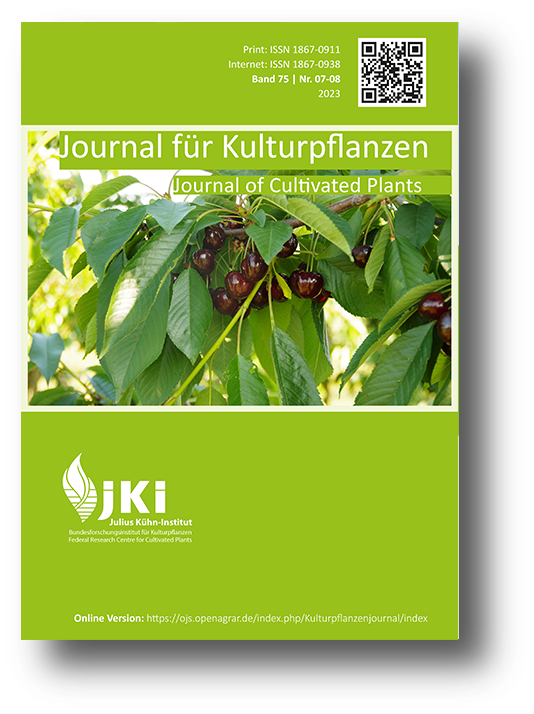Diversität und Verbreitung von Diplodia spp. – dem Erreger des Schwarzen Rindenbrandes an Kernobst – in Deutschland
DOI:
https://doi.org/10.5073/JfK.2023.07-08.03Schlagworte:
Schwarzer Rindenbrand, Kernobst, Apfel, Malus, DiplodiaAbstract
Der Schwarze Rindenbrand, der von Pilzen aus der Gattung Diplodia hervorgerufen wird, stellt eine zunehmende Bedrohung für den Kernobstanbau in Deutschland dar. Um die Verbreitung der Erkrankung im Bundesgebiet zu ermitteln, wurden in einem nicht repräsentativen Monitoring 423 Rindenproben mit verdächtigen Symptomen aus allen Bundesländern untersucht. In 62 % der untersuchten Proben waren Pilze aus der Gattung Diplodia zu isolieren, wobei die Art D. bulgarica mit 56,6 %, gefolgt von D. seriata mit 28,3 % das Diplodia-Artenspektrum dominiert haben. D. malorum (7,8 %), D. mutila (4,9 %), D. juglandis (1,6 %) und D. intermedia (0,8 %) traten dagegen relativ selten auf, wobei die beiden letztgenannten Arten Erstnachweise an Apfel in Deutschland sind.
Veröffentlicht
Ausgabe
Rubrik
Lizenz
Copyright (c) 2023 Julia Zugschwerdt, Kamilla Zegermacher, Gabriele Zgraja, Gritta Schrader, Clovis Douanla-Meli, Jan Hinrichs-Berger

Dieses Werk steht unter der Lizenz Creative Commons Namensnennung 4.0 International.
Der Inhalt dieser Zeitschrift ist lizenziert unter der Creative Commons - Namensnennung 4.0 Lizenz. Sie dürfen das Material in jedwedem Format oder Medium vervielfältigen und weiterverbreiten, remixen, verändern und darauf aufbauen und zwar für beliebige Zwecke, solange die Originalpublikation zitiert wird (Autoren, Titel, Jahr, Zeitschrift, Band, Nummer, Seiten).
Urheber- und Nutzungsrechte verbleiben beim Autor. Die Autoren räumen dem Journal für Kulturpflanzen sowie dem Julius Kühn-Institut und dem OpenAgrar-Repositorium das nicht-ausschließliche Nutzungsrecht ein, das Werk zu verbreiten und zu verwerten.







